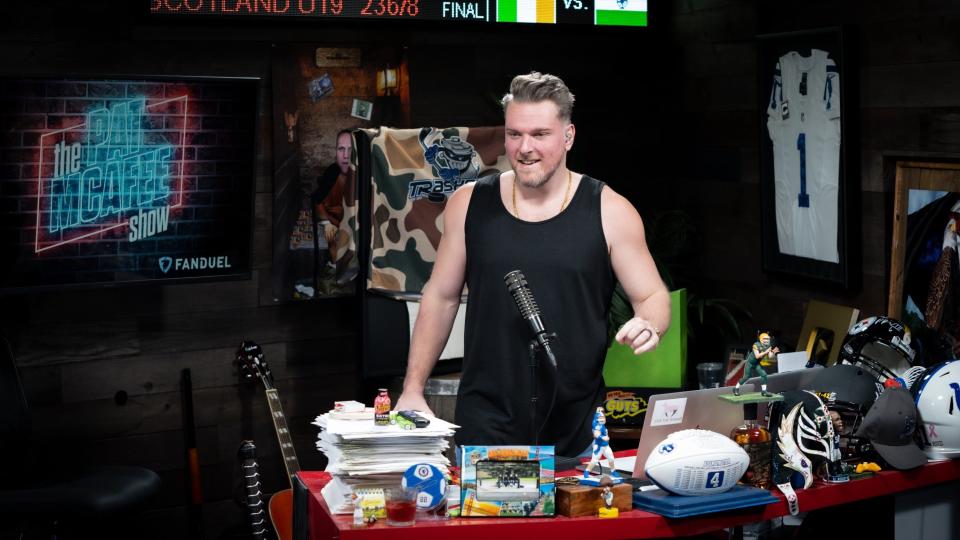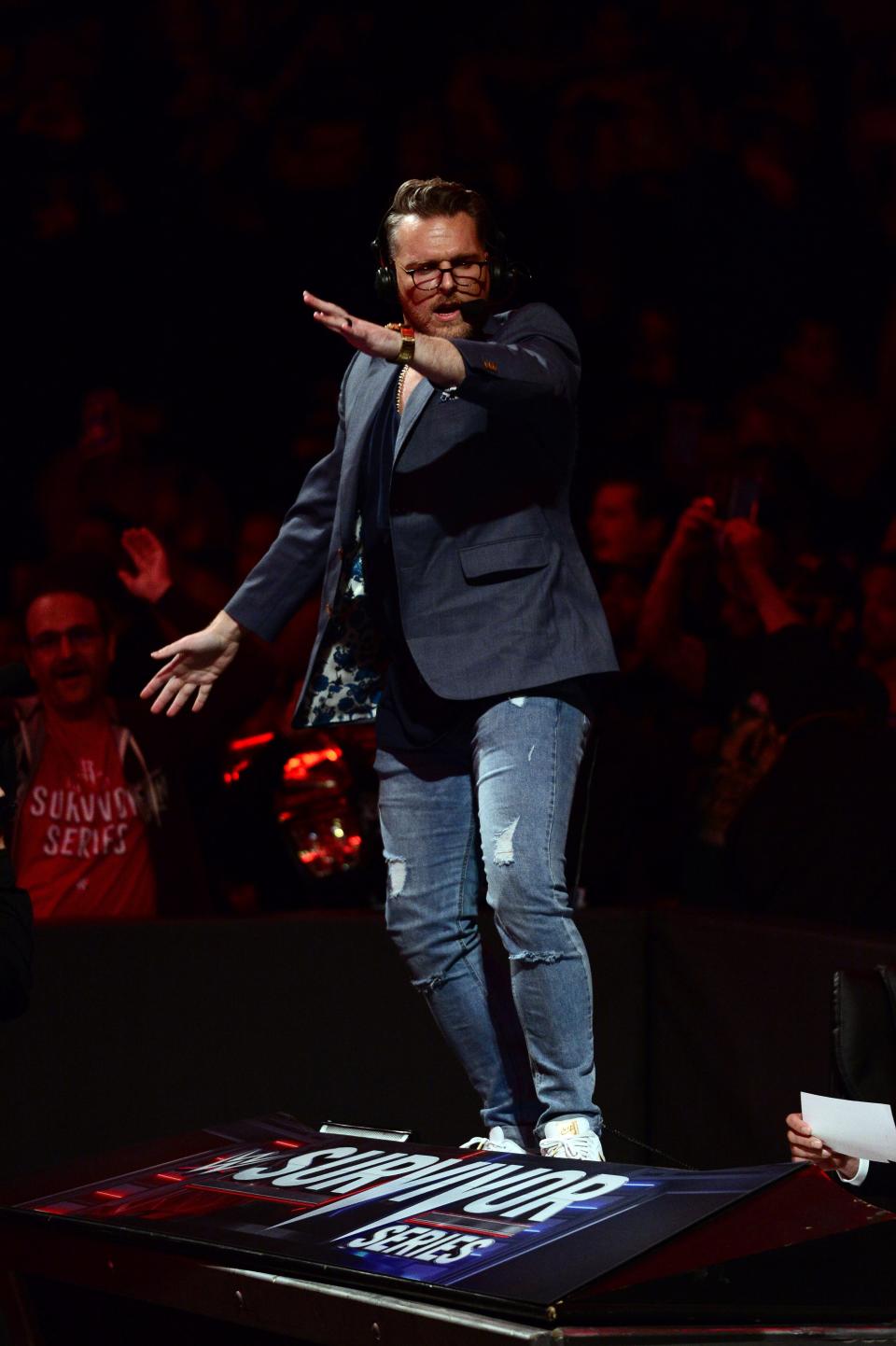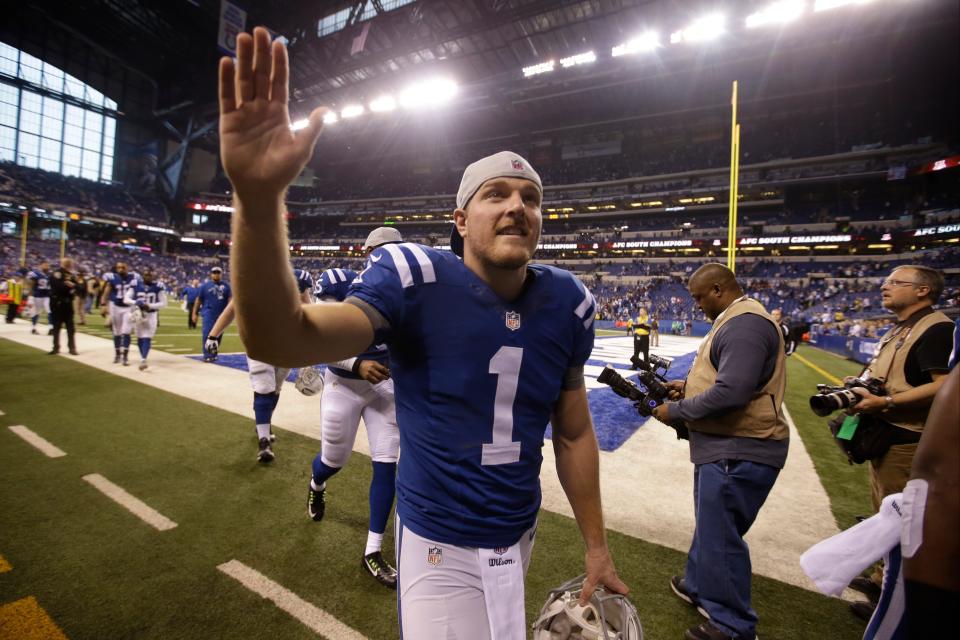'There's nobody like him:' How Pat McAfee bet on himself to conquer the modern media world
Pat McAfee, his high-tempo howl reduced to a breathy rasp, was running out of energy. Perhaps the most unlikely tycoon in sports media history, McAfee had been going hard within the confines of his Indianapolis studio for more than two hours on a Tuesday in January and his A-list guest – the NFL's greatest quarterback of 2021 – was running late.
The sudden pause reduced McAfee to quiet contemplation.
“Are we the luckiest group of people of all time?” McAfee asked his posse of characters who help comprise The Pat McAfee Show, a three-hour hallucination as much as it is a sports talk show. “I think about that a lot.
“It has been a very self-reflective time over here the last couple of months. But if I get insufferable over the next couple of years, please let me know.”
McAfee has reason to believe he and his boys, as he calls them, are the product of right place, right time. McAfee’s rise as a punter-turned podcaster-turned YouTuber climbed a summit in lockstep with sports gambling, which the Supreme Court made a legalized reality in 2018 and has increasingly become a daily routine in the more than 25 states in which it’s been approved.

And so FanDuel, locked in a blood feud with DraftKings for the largest share of a suddenly explosive market, gazed across a cluttered media landscape, factored in the rabid engagement McAfee’s show enjoyed among a young demographic and made him an offer that reportedly guarantees him more money than almost any NFL player: $120 million over four years to talk sports, mix in some gambling and pledge fealty to FanDuel.
It is funny money, certainly, shot out of a venture capital cannon at just the right time to land on McAfee’s porch so in a sense, yes, he’s lucky. Certainly, an alternate case could be made, one involving preparation meeting opportunity and all that.
Yet reducing McAfee to all-caps wording on a motivational poster would miss the point of his appeal, which is initially hard to pinpoint but grows apparent over time.
“The dude’s brilliant. He is just so talented and natural and there’s nobody like him,” A.J. Hawk, the former Green Bay Packer and Ohio State linebacker who rides shotgun with McAfee for two hours a show, tells USA TODAY Sports. “He connects because he’s authentic, 100% real. He’s so high energy, but such a good dude behind all of it. You can’t be a piece of garbage and fake that.
“Pat’s a great guy and that’s why people love watching the show. It’s easy to connect with that.”
Hawk was chatting Monday afternoon as he rolled down I-70 from his suburban Columbus home to Indianapolis, where he’d join McAfee and the boys to hop a jet bound for Los Angeles and Super Bowl 56. Radio Row at the Los Angeles Convention Center will be the show’s home for the week, a petri dish of ready-made guests making their way from host to host.
On the surface, McAfee’s vibe and his volume – a trademark pitch that’s coarse but not abrasive, like 180-grit sandpaper – fits right in with the myriad screamers and dreamers on the row. Yet five years after startlingly calling it a career despite a career-best season as the Indianapolis Colts’ punter, he has transcended the sports media ecosystem on so many levels.
After all, few media figures will bring in average annual revenue off one sponsorship that exceeds the guaranteed salary of most NFL quarterbacks. And only one proved to be appointment viewing this year.
Big trust
Connections are a funny thing.
Hawk’s introduction to McAfee came in the form of a two-word greeting – “What’s up?” – before the coin toss of a Bengals-Colts exhibition game in 2015. As both eased into retirement, McAfee would host Hawk on his podcast and they’d co-host the “Laces Out” podcast when McAfee took his material to Barstool Sports.
Eventually, Hawk finessed McAfee into a charity golf tournament in the Bahamas hosted by his former Packers teammate, Aaron Rodgers, who twisted McAfee’s arm to do a little stand-up comedy at the banquet.
Make no mistake: McAfee was well on his way to a successful and likely lucrative career in electronic media before he and Rodgers became fast friends and the future Hall of Famer began regularly guesting on his show in 2019.
NO BIG DEAL? NFL players suspended for PED violations at least 258 times since 2001
EXCLUSIVE DATABASE: NFL players suspended for performance-enhancing drug use since 2001
Yet, consider the sequence of events that unfolded, providing two years of blaring headlines and unfathomable exposure for McAfee's show:
A global pandemic strikes. The Packers draft Rodgers’ presumed replacement, Jordan Love. Rodgers puts together an MVP season in 2020, only to lose to Tom Brady after Packers coach Matt LaFleur made a dubious late-game decision in the NFC title game. Rodgers falls out with the Packers. Rodgers resists the COVID-19 vaccine, leaning on His Own Research. Rodgers tests positive for COVID, is excoriated for deceiving the news media that he was “immunized” earlier in the year. Rodgers puts together an MVP season anyway. Rodgers is bounced from the playoffs in a stunning upset. Rodgers says he’s cool with the Packers, leans toward a return.
It was a perfect two-year storm of newsmaker constantly making news, and much of it unfolded on Aaron Rodgers Tuesday on The Pat McAfee Show.
Soon, Rodgers' appearances created another media ecosystem: Rodgers drops bombs on McAfee's show. News organizations hurry to pick it up. Takes are heated. Rodgers comes back to refute takes. Cycle begins anew.
It certainly placed McAfee, who declined multiple interview requests for this story, in an unusual spot for a host whose show leans toward the comedic and jocular.
Rodgers' scientifically refuted pandemic theories went unchallenged in real time, leaving McAfee open to criticism, and after Rodgers' Nov. 5 appearance apologized for "potentially not hammering home the science and stats like I should have," while noting his limitations as an ex-punter and talk-show host.
"Ain’t nobody thinking to themselves, ‘I’m gonna go to Pat McAfee to learn what to do with my real life," McAfee, who acknowledged that he is vaccinated, said last month. "We are not the people in society you should be going to for real life answers.
NEED TO KNOW: Odds, date, time, TV, halftime show details for Sunday's Super
"By the way, neither is Aaron Rodgers. We should figure out who we need to talk to."
The default setting is to consider the McAfee-Rodgers dynamic an offshoot of modern sports media sycophantry, not unlike the Ahmad Rashad-Michael Jordan sessions back in the ‘90s or the air-brushed copy flowing out of The Players’ Tribune. Rodgers will often chide Hawk or one of the boys for asking a “classic media question,” as if he isn’t appearing on a significant and increasingly influential media platform at that moment.
Yet if Aaron Rodgers Tuesday is not capital-J Journalism in the traditional sense, its mere existence is a tribute to McAfee’s ability to cultivate relationships, to establish trust and to, as if exercising a quick-twitch muscle, hit back with timely follow-ups.
All skills that any journalist should appreciate.
“You see how current and former players relate to him and are attracted to him and trust him,” says a sports media industry executive who spoke to USA TODAY Sports on condition of anonymity to speak candidly. “That doesn’t happen all the time. He has strong relationships. You couple that with credibility as a former, very successful player. That has appeal.
“You throw all this into a big melting pot, you come away with a victory in today’s world.”
Coalition of the willing
And that’s not easy. Cord-cutting continues to ravage traditional media, with behemoths like McAfee’s former employer, ESPN, confronting diminished relevance and revenue. Endless streaming services fragment audience. And now, anyone with an MV7 microphone and a tripod can be a podcaster, a YouTuber, and scramble for the scraps of revenue that may flow out of the proverbial internet.
McAfee knew that landscape when he ditched the Colts at age 29, after a Pro Bowl season in which he averaged a league-best 49.1 yards per punt. And he managed to navigate it with aplomb, answering the call from Barstool Sports founder Dave Portnoy to launch a podcast there, managing to gracefully exit before he was too strongly associated with the famously misogynistic platform.
He appeared on several platforms with ESPN, including College GameDay and game broadcasts, all the while cranking out his own show and picking up a ringside gig with WWE, even performing a stunning heel turn during one event.

As it turns out, the gold was in his own product.
In addition to appearing on SiriusXM, The Pat McAfee Show has 1.7 million YouTube subscribers and has exhibited consistent growth, adding 47,000 subscribers in the past month. Commenters will often note the growing viewership as each show proceeds, as if they, too, are vested in the success.
Rodgers’ appearances certainly spiked the numbers, typically from around 40,000 live viewers upon his arrival to over the 50,000 mark by the time his sequence is finished. During Rodgers’ highly-anticipated Jan. 25 appearance, which came after the Packers' playoff loss and ostensibly could generate news about his future, the total swelled to 60,000 and peaked at 72,000 – nearly enough to fill Lambeau Field.
Eventually, virtually every show clip receives well more than 100,000 views. Rodgers' most notorious appearance, on Nov. 5, has nearly 1.5 million views.
And what does it all mean, really?
Success in the TV game is usually measured by millions of viewers, yet many might have stumbled upon this sports shoutfest or that hot-take factory merely because the TV was tuned to that channel, or it was on in the bar, sound off.
In this media environment, a five-figure live audience – eventually spliced into hundreds of thousands of views on multiple platforms – was sufficient to drive a nine-figure investment from FanDuel.
“I don’t think there’s one metric that you can say defines success,” says Brandon Ross, co-founder of LightShed Partners, a technology, media and telecommunications independent research firm. “If you’re a brand like a FanDuel and you’re interested in utilizing content or personality to drive your user base, your customer acquisition, you do want somebody that has passionate fans that are willing to listen and be loyal to the influencer.
BILLION-DOLLAR BULLIES: SoFi Stadium, site of Super Bowl 56, is multibillion dollar dream for three, and nightmare for thousands
“Here, you have a loved personality and that personality can drive bettors. One thing that is hard to define is passion. And those who have passionate followings are the ones who can generally drive commerce.”
Or, as Hawk says of the motivated McAfee viewer: “You have to go find it. It’s not showing up on 'Guide' if you hit 'Guide' on your old school cable TV. I think once they come, they stay.”
Hawk may yet have to hit “Guide” again someday to catch the full McAfee experience. He and McAfee attended last month’s college football title game as the guest of ESPN president Jimmy Pitaro. McAfee did not discourage the notion of a return to GameDay in a conversation Monday with ESPN analyst Kirk Hirbstreit.
Pitaro declined comment, but ESPN released a statement to USA TODAY Sports noting that McAfee “is a talented and entertaining commentator who was very well-received on College GameDay and other ESPN programs. We would certainly be interested in finding opportunities to work with him again in the future.”
Loyalty, loyalty, loyalty
And perhaps that’s McAfee’s greatest skill – an ability to leapfrog careers and entities without burning bridges, a two-way street of loyalty that plays out in his studio every day.
Two of McAfee’s crew members, Anthony “Tone Digz” DiGuilio and Nick Maraldo, go back to high school with McAfee in Plum, Pennsylvania, a borough just east of Pittsburgh. Phil Mains, the show’s CFO, has known McAfee since second grade. Shortly after the FanDuel deal was announced, McAfee released an 18-minute manifesto expressing thanks for the humbling riches bestowed upon him.
In doing so, he pledged to donate more than $6.5 million to various youth sports initiatives in Plum and to foundations headed by former Colts teammates Peyton Manning and Robert Mathis, along with $1 million to each of his parents and $250,000 bonuses to each crew member.
"You take care of your friends from home," says Matt Morgan, a 1998 Plum graduate and the school's head football coach since 2013. "Your ride-or-die guys from day one."
The son of a truck driver and secretary, McAfee speaks of growing up in a 700-square foot house “at the bottom of the hill of a hilly town,” a home purchased for just $37,000, refinanced on multiple occasions to get Pat, eventually, to West Virginia on a kicking scholarship.

Morgan, who played at Pitt and briefly in the NFL with Buffalo and St. Louis, remembers seeing a young McAfee working out at the school, "dropping bombs" as he angled for a scholarship. Now, Morgan sees McAfee's dedication up close, from an initial funding of a revamped weight room in 2013 to his current pledge, which is already impacting the school and community.
It's simple things, like pitching machines for the baseball team, or new uniforms for cheerleaders after the school district changed Plum's color scheme.
"It’s very overwhelming what he’s willing to give back to this community as far as youth and high school sports go," says Morgan. "He's always been supporting us and now that he’s giving back to all sports it’s even better.
"He doesn’t change his personality around us. He will show up unannounced and if he sees our kicker working by himself, he’ll go out and work with him."
McAfee's Pittsburgh lineage is a constant theme of the show, most notably the “yinzer” lilt he and the boys will fall into; a gambling advice spinoff show is called “Hammer Dahn.”
“Those guys,” Hawk says of the boys, “are just their own weird geniuses.”
Trace a line from Hawk’s Centerville, Ohio hometown, through Columbus and on to Pittsburgh, and the show’s upbringing is largely contained in that triangle.
It’s a rare bit of Rust Belt representation for a national show – typically the domain of big-city elites – although it does lack a bit of, well, diversity.
Yet McAfee procures and connects strongly with a swath of guests beyond his bubble. A September 2019 interview with running back Marshawn Lynch was among the more candid media hits Lynch has ever done, McAfee getting him to open up on the long-term damage done when the Seattle Seahawks’ Super Bowl 49 bid ended in a stunning goal-line interception.
Former Colts teammate Darius Butler, a regular show contributor, brings a candor that’s a perfect match for McAfee’s energy. It doesn’t hurt that a forum in which f-bombs can fly freely can get anyone from Lynch to Rodgers to Bills quarterback Josh Allen to open up, quickly.
And in a sports environment that’s increasingly football and everything else, McAfee can speak with authority on the subject and wax just as passionately on a four-walkoff playoff weekend as he can a boosted parlay that fell a half-yard short of cashing.
That bodes well for a future in an industry workshopping almost any idea that gains traction. As the network executive notes, perhaps the “Manningcast” mode of game production will become standard. Entertainment will likely intersect even more with competition. Gambling, certainly, is here to stay.
It’s a daunting landscape for many, save for those never afraid to bet on themselves.
“With the enthusiasm and the knowledge he has,” says Hawk, “there’s no situation he’d be scared or worried about. He’s absolutely fearless.
“And most people aren’t.”
Follow Gabe Lacques on Twitter @GabeLacques
This article originally appeared on USA TODAY: How former NFL player Pat McAfee bet on himself to conquer media world

